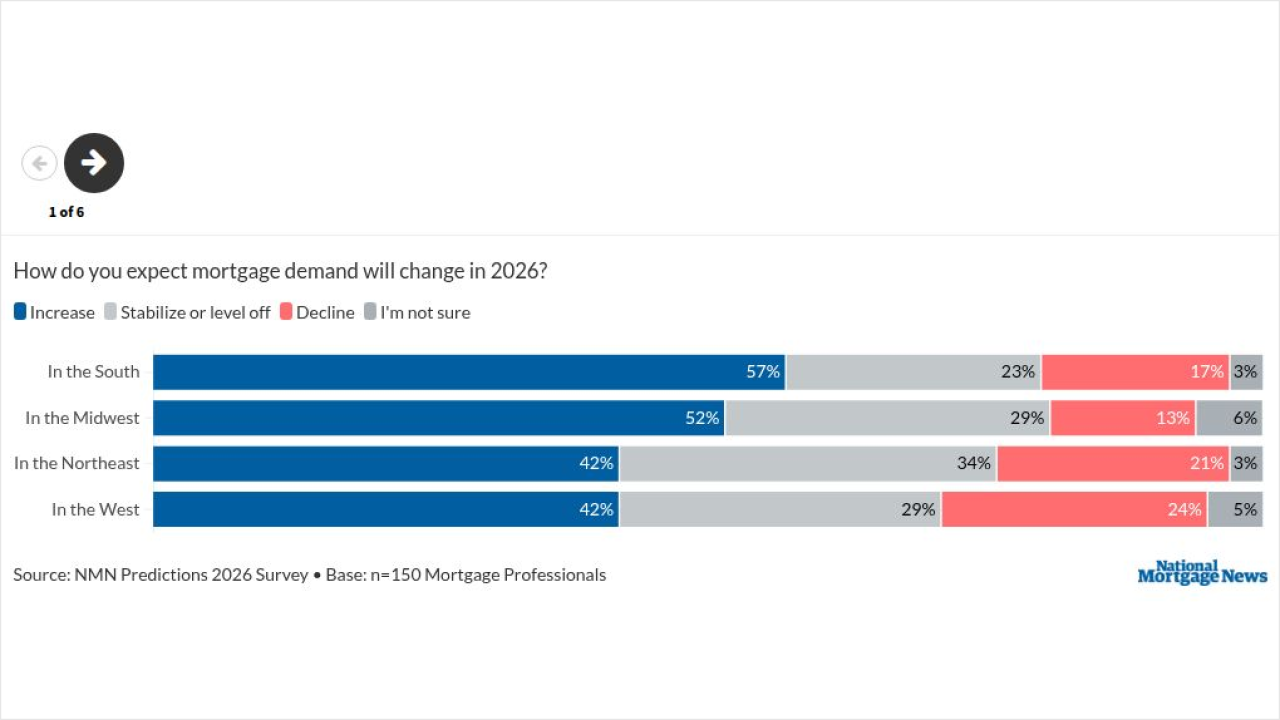Year-end existing home sales were
In Fannie Mae's December forecast, 2021 will end with a record high $4.45 trillion in mortgage originations;
The government-sponsored enterprise increased its 2022 outlook to $3.35 trillion, compared with $3.26 trillion. For 2023, the forecast of $3.11 trillion was virtually unchanged from the previous month.

Overall U.S. economic activity is stronger than anticipated, and Fannie Mae boosted its year-over-year gross domestic product growth to 5.5%, up 0.7 percentage points from November.
However, for 2022, rising inflation led to a reduction in the outlook for GDP growth to 3.2%.
"The Fed recently acknowledged that inflation is unlikely to be transitory, and it will now attempt to engineer a soft landing, one in which inflation moderates to acceptable levels and economic growth decelerates but doesn't contract," Fannie Mae Chief Economist Doug Duncan said in a press release. "Whether the Fed is able to thread this historically difficult policy needle is shaping up to be one of the most consequential economic storylines of 2022."
While Duncan's latest forecast calls for two increases in 2022 by the Fed for short-term rates — mortgage rates typically react to changes in the 10-year Treasury, which is outside of the Fed's purview — the report noted the market currently considers a high probability of a third increase.
Purchase originations are now expected to top $2 trillion next year (November's forecast was just under that mark), but not all the news is good.
Affordability will have a big impact on the market, as the pool of potential buyers who have the reserves to deal with the current high home prices is shrinking. The Fannie Mae economic team looked at mortgage-backed securities issuance, not just from their company but also Freddie Mac and Ginnie Mae, and found that first-time home buyer total (back-end) debt-to-income ratios started rising meaningfully through October.
"While still low relative to the recent past, a rise in this metric in 2018 foreshadowed a slowdown in sales and house price growth, while regional variation helped explain where the slowdown was greatest," the report accompanying the forecast noted. "As this indicator rises, we see it similarly pointing to softening purchase demand in 2022 with some of the hotter metro areas of this past year possibly seeing outsized deceleration."
The forecast makes the assumption that
Fannie Mae is not the only economic forecaster that believes the ongoing pandemic will not limit housing in 2022.
"While the global pandemic remains a part of our daily lives, if the health situation continues to improve, the housing sector will once again have the wind at its back in 2022," said First American Financial Deputy Chief Economist Odeta Kushi. "Although we're likely to remain in a competitive sellers' market through next year, it's possible that the affordability crunch and ongoing supply shortage may ease the full-throttle demand we've seen in 2021 and result in a
Low mortgage rates, combined with higher wages, will increase home purchase power, Kushi said. Continued trends allowing work from home will also allow potential first-time home buyers to move to less expensive locations.
On the other hand, first-time buyers are looking at continuing home price appreciation, the lack of inventory in the lower-priced housing tiers and rising mortgage rates. "While the fundamentals support continued first-time home buyer demand in 2022, these buyers will face an uphill battle if housing supply remains near historic lows," Kushi said.




